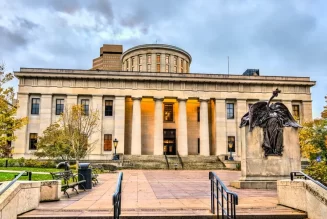A GOP-controlled congressional committee has unveiled a key spending bill that contains a provision to block marijuana rescheduling, while also amending a longstanding rider protecting medical cannabis states from federal interference by adding new language to authorize enhanced penalties for sales near schools and parks.
The 2025 appropriations legislation covering Commerce, Justice, Science, and Related Agencies (CJS), which is set to receive a subcommittee markup on Wednesday, also retains a section safeguarding state hemp research programs.
But the new marijuana provisions are sure to prove controversial, with language hostile to cannabis reform included in the base CJS bill for the first time.
One new section would prevent the Justice Department from using its funds to reschedule or deschedule marijuana. This comes amid an active rulemaking process to move cannabis from Schedule I to Schedule III of the Controlled Substances Act (CSA), as DOJ formally proposed last month.
SEC. 623. None of the funds appropriated or other wise made available by this Act may be used to reschedule marijuana (as such term is defined in section 102 of the Controlled Substances Act (21 U.S.C. 802)) or to remove marijuana from the schedules established under section 202 of the Controlled Substances Act (21 U.S.C. 812).
GOP senators have separately tried to block the administration from rescheduling cannabis as part of a standalone bill filed last September, but that proposal has not received a hearing or vote. Including such a ban in key annual spending legislation is a way for opponents to force the issue forward.
The appropriations measure still includes a longstanding rider to prevent DOJ from using its funds to interfere in the implementation of state medical marijuana programs that has been part of federal law since 2014, but the committee added new language stipulating that the Justice Department can still enforce a section of U.S. code that calls for increased penalties for distributing cannabis within 1,000 feet of an elementary school, vocational school, college, playground or public housing unit.
Certain states such as Nevada and Washington State already impose zoning restrictions that prohibit marijuana businesses from operating within 1,000 feet of schools, but many have smaller buffers. For example, the rule in New York is that retailers can’t be located within 500 feet of schools, while California sets that boundary at 600 feet.
While it appears that the intent could be to open up medical cannabis dispensaries operating in closer proximity to schools to federal enforcement action, it’s not clear how that would work logistically. The statute DOJ would be able to enforce isn’t an offense on its own; rather, it enhances the penalty for a violation of a separate statute. The overall medical marijuana rider would ostensibly prevent the Justice Department from using its funds to prosecute people over that underlying law in the first place.
SEC. 531. (a) None of the funds made available under this Act to the Department of Justice may be used, with respect to any of the States of Alabama, Alaska, Arizona, Arkansas, California, Colorado, Connecticut, Delaware, Florida, Georgia, Hawaii, Illinois, Indiana, Iowa, Kentucky, Louisiana, Maine, Maryland, Massachusetts, Michigan, Minnesota, Mississippi, Missouri, Montana, Nevada, New Hampshire, New Jersey, New Mexico, New York, North Carolina, North Dakota, Ohio, Oklahoma, Oregon, Pennsylvania, Rhode Island, South Carolina, South Dakota, Tennessee, Texas, Utah, Vermont, Virginia, Washington, West Virginia, Wisconsin, and Wyoming, or with respect to the District of Columbia, the Commonwealth of the Northern Mariana Islands, the United States Virgin Islands, Guam, or Puerto Rico, to prevent any of them from implementing their own laws that authorize the use, distribution, possession, or cultivation of medical marijuana.
(b) Funds made available under this Act to the Department of Justice may be used to enforce violations of 21 U.S.C. 860.
The CJS bill also keeps intact another longstanding rider preventing DOJ interference in state hemp research programs.
SEC. 530. None of the funds made available by this Act may be used in contravention of section 7606 (‘‘Legitimacy of Industrial Hemp Research’’) of the Agricultural Act of 2014 (Public Law 113–79) by the Department of Justice or the Drug Enforcement Administration.
The new marijuana provisions are likely to be challenged as the bill advances, with cannabis reform supporters potentially seeking to amend them out in committee or on the floor. It’s also unlikely that the Senate version will contain comparable language under Democratic control, raising further doubts about their prospects of being enacted into law.
In any case, the legislation’s anti-cannabis sections are the latest sign of the ideological divisions in Congress. As more states move to legalize marijuana—and with public support for the reform at an all-time high—certain conservative members continue to seek to rollback already limited federal cannabis protections.
Meanwhile, the House Rules Committee blocked all proposed marijuana amendments—some that were pro-reform and others that were anti-reform—from floor consideration as part of a large scale defense bill. That means a measure included in the base bill to prevent military branches from testing recruits for cannabis as a condition of enlistment has been left intact, despite opposition from the White House.
Prior to that, the Rules Committee rejected proposed amendments to the National Defense Authorization Act (NDAA) to prevent security clearance denials based on past marijuana use and codify that military servicemembers can’t be penalized for using or possessing federally legal hemp products and allow veterans to access state medical marijuana programs and eliminate a VA directive barring the department’s doctors from issuing cannabis recommendations.
While the panel didn’t allow the VA-specific amendment to advance as part of the NDAA, the reform was approved by the House this month as part of appropriations legislation covering Military Construction, Veterans Affairs and Related Agencies (MilConVA).
The House Appropriations Committee separately passed another spending bill this month that was amended to remove provisions safeguarding banks that work with state-licensed cannabis businesses. Members also reattached a section blocking Washington, D.C. from legalizing marijuana sales that was omitted from the base bill.
Photo courtesy of Brian Shamblen.











